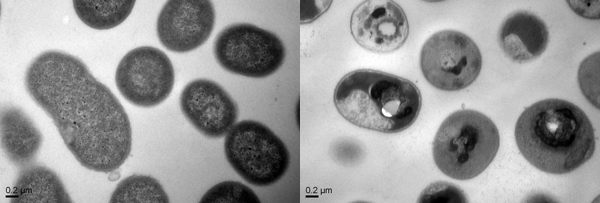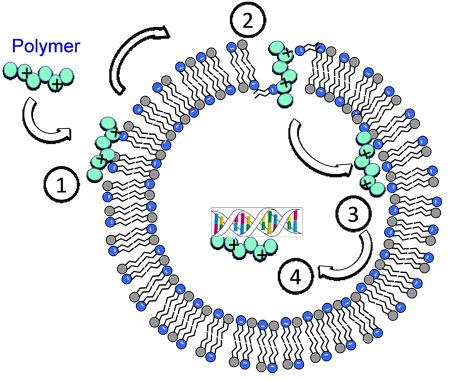An international research team led by the Institute of Bioengineering and Nanotechnology (IBN) of the Agency for Science, Technology and Research (A*STAR) and IBM Research developed a synthetic molecule that can kill five deadly types of multidrug-resistant bacteria with limited, if any, side effects. Their new material could be developed into an antimicrobial drug to treat patients with antibiotic-resistant infections. This finding was reported in the scientific journal Nature Communications.
Superbugs that are resistant to antibiotics are a serious health threat. According to the UK Review on Antimicrobial Resistance, superbugs kill around 700,000 people worldwide each year. By 2050, 10 million people could die each year if existing antibiotics continue to lose their effectiveness.
“There is an urgent global need for new antimicrobials that are effective against superbugs. The situation has become more acute because bacteria are starting to develop resistance to the last-line antibiotics, which are given only to patients infected with bacteria resistant to available antibiotics,” said Professor Jackie Y. Ying, Executive Director of IBN.
The research community is trying to develop alternatives to antibiotics using synthetic polymers. However, the antimicrobial polymers developed so far are either too toxic for clinical use, not biodegradable or can only target one type of bacteria.
To address this problem, Dr Yi Yan Yang from IBN brought together a multidisciplinary research team from the US, China and Singapore to develop a new class of antimicrobial polymers called guanidinium-functionalized polycarbonates with a unique killing mechanism that can target a broad range of multidrug-resistant bacteria. It is biodegradable and non-toxic to human cells.
The polymer kills bacteria in the following way. First, the polymer binds specifically to the bacterial cell. Then, the polymer is transported across the bacterial cell membrane into the cytoplasm, where it causes precipitation of the cell contents (proteins and genes), resulting in cell death.

The team tested the polymers on mice infected with five hard-to-treat multidrug-resistant bacteria: Acinetobacter baumannii, Escherichia coli, Klebsiella pneumoniae, methicillin-resistant Staphylococcus aureus and Pseudomonas aeruginosa. These superbugs are commonly acquired by patients in the hospitals and can cause systemic infections that lead to septic shock and multiple organ failure. The results showed that the bacteria were effectively removed from the mice and no toxicity was observed.
The researchers then further tested the effectiveness of the polymers on mice with two types of systemic infections caused by superbugs: peritonitis (an infection of the stomach’s inner lining) and lung infections from Pseudomonas aeruginosa. The polymers eliminated the bacterial infections in both groups of mice with negligible toxicity.
Dr Yi Yan Yang, Group Leader at IBN said, “We have demonstrated the first example of a biodegradable synthetic macromolecule with broad-spectrum antimicrobial activity in mice, unique killing mechanism and no toxicity. Once the polymer finishes its job of killing the bacteria, it will be naturally degraded after three days and will not remain in the body. This antimicrobial agent shows great promise for the treatment and prevention of multidrug-resistant systemic infections.”
“This study illustrates the potential for this new research field we denote as ‘macromolecular therapeutics’ to create entirely new classes of treatments for multiple diseases,” said Dr James Hedrick, Distinguished Research Staff Member, IBM Research – Almaden, San Jose, California. “In 2016, we demonstrated the efficacy of synthetic polymers to combat deadly viral diseases. The current research for treating bacterial infections rounds out our ability to someday treat a spectrum of infectious diseases with a single, new type of mechanism without the onset of resistance.”

To determine whether the bacteria will develop any resistance to the polymer, the team collaborated with Dr Paola Florez de Sessions at A*STAR’s Genome Institute of Singapore and the Cell Engineering group of Dr Simone Bianco at IBM Research – Almaden to perform genomic analysis. They found that the bacteria did not show any resistance development even after multiple treatments with the polymer.
This study was also done in collaboration with the University of North Dakota’s School of Medicine and Health Sciences, and the First Affiliated Hospital of Zhejiang University’s College of Medicine.
IBN and IBM are now seeking collaborations with pharmaceutical companies to develop the polymers into an antimicrobial treatment for patients.
Reference:
Willy Chin, Guansheng Zhong, Qinqin Pu, Chuan Yang, Weiyang Lou, Paola Florez de Sessions, Balamurugan Periaswamy, Ashlynn Lee, Zhen Chang Liang, Xin Ding, Shujun Gao, Collins Wenhan Chu, Simone Bianco, Chang Bao, Yen Wah Tong, Weimin Fan, Min Wu, James L. Hedrick and Yi Yan Yang, “A Macromolecular Approach to Eradicate Multidrug Resistant Bacterial Infections While Mitigating Drug Resistance Onset,” Nature Communications, 9 (2018) 917.
About the Institute of Bioengineering and Nanotechnology (IBN)
The Institute of Bioengineering and Nanotechnology (IBN) is the world’s first bioengineering and nanotechnology research institute. Established in 2003, IBN’s mission is to conduct multidisciplinary research across science, engineering, and medicine for breakthroughs to improve healthcare and quality of life. IBN’s research activities are focused on Nanomedicine, Synthetic Biosystems, Biodevices and Diagnostics, and Green Chemistry and Energy. The Institute has published over 1,320 papers in leading scientific journals, filed over 660 active patents and patent applications on its inventions, and established 12 spin-off companies. To nurture young research talents, IBN runs a Youth Research Program that offers students research attachment opportunities and exposure to biomedical research.
About the Agency for Science, Technology and Research (A*STAR)
The Agency for Science, Technology and Research (A*STAR) is Singapore’s lead public sector agency that spearheads economic oriented research to advance scientific discovery and develop innovative technology. Through open innovation, we collaborate with our partners in both the public and private sectors to benefit society.
As a Science and Technology Organization, A*STAR bridges the gap between academia and industry. Our research creates economic growth and jobs for Singapore, and enhances lives by contributing to societal benefits such as improving outcomes in healthcare, urban living, and sustainability.
We play a key role in nurturing and developing a diversity of talent and leaders in our Agency and Research Institutes, the wider research community and industry. A*STAR oversees 18 biomedical sciences and physical sciences and engineering research entities primarily located in Biopolis and Fusionopolis.
Source
A*STAR, press release, 2018-03-06.
Supplier
Agency For Science, Technology And Research (A*STAR)
IBM Research
University of North Dakota
Zhejiang University
Share
Renewable Carbon News – Daily Newsletter
Subscribe to our daily email newsletter – the world's leading newsletter on renewable materials and chemicals










